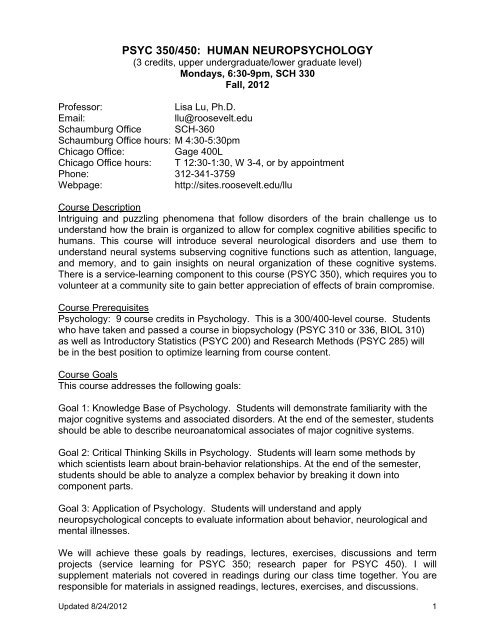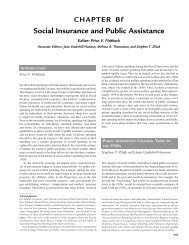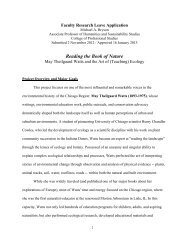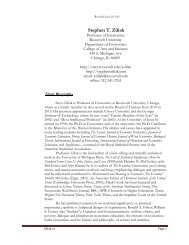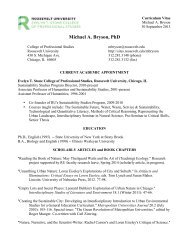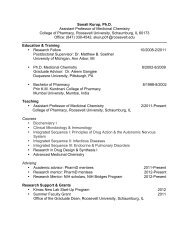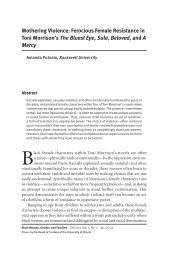PSYC 350/450 HUMAN NEUROPSYCHOLOGY
PSYC 350/450 sample syllabus - Roosevelt University Sites
PSYC 350/450 sample syllabus - Roosevelt University Sites
Create successful ePaper yourself
Turn your PDF publications into a flip-book with our unique Google optimized e-Paper software.
<strong>PSYC</strong> <strong>350</strong>/<strong>450</strong>: <strong>HUMAN</strong> NEURO<strong>PSYC</strong>HOLOGY<br />
(3 credits, upper undergraduate/lower graduate level)<br />
Mondays, 6:30-9pm, SCH 330<br />
Fall, 2012<br />
Professor:<br />
Lisa Lu, Ph.D.<br />
Email:<br />
llu@roosevelt.edu<br />
Schaumburg Office SCH-360<br />
Schaumburg Office hours: M 4:30-5:30pm<br />
Chicago Office:<br />
Gage 400L<br />
Chicago Office hours: T 12:30-1:30, W 3-4, or by appointment<br />
Phone: 312-341-3759<br />
Webpage:<br />
http://sites.roosevelt.edu/llu<br />
Course Description<br />
Intriguing and puzzling phenomena that follow disorders of the brain challenge us to<br />
understand how the brain is organized to allow for complex cognitive abilities specific to<br />
humans. This course will introduce several neurological disorders and use them to<br />
understand neural systems subserving cognitive functions such as attention, language,<br />
and memory, and to gain insights on neural organization of these cognitive systems.<br />
There is a service-learning component to this course (<strong>PSYC</strong> <strong>350</strong>), which requires you to<br />
volunteer at a community site to gain better appreciation of effects of brain compromise.<br />
Course Prerequisites<br />
Psychology: 9 course credits in Psychology. This is a 300/400-level course. Students<br />
who have taken and passed a course in biopsychology (<strong>PSYC</strong> 310 or 336, BIOL 310)<br />
as well as Introductory Statistics (<strong>PSYC</strong> 200) and Research Methods (<strong>PSYC</strong> 285) will<br />
be in the best position to optimize learning from course content.<br />
Course Goals<br />
This course addresses the following goals:<br />
Goal 1: Knowledge Base of Psychology. Students will demonstrate familiarity with the<br />
major cognitive systems and associated disorders. At the end of the semester, students<br />
should be able to describe neuroanatomical associates of major cognitive systems.<br />
Goal 2: Critical Thinking Skills in Psychology. Students will learn some methods by<br />
which scientists learn about brain-behavior relationships. At the end of the semester,<br />
students should be able to analyze a complex behavior by breaking it down into<br />
component parts.<br />
Goal 3: Application of Psychology. Students will understand and apply<br />
neuropsychological concepts to evaluate information about behavior, neurological and<br />
mental illnesses.<br />
We will achieve these goals by readings, lectures, exercises, discussions and term<br />
projects (service learning for <strong>PSYC</strong> <strong>350</strong>; research paper for <strong>PSYC</strong> <strong>450</strong>). I will<br />
supplement materials not covered in readings during our class time together. You are<br />
responsible for materials in assigned readings, lectures, exercises, and discussions.<br />
Updated 8/24/2012 1
<strong>PSYC</strong> <strong>350</strong>/<strong>450</strong> Human Neuropsychology, Fall 2012<br />
Description of Instructor<br />
I matriculated from University of Florida’s Clinical Psychology program in 2000, where I<br />
specialized in neuropsychology. My clinical interests include problems presented by<br />
pediatric neuropsychology populations, and my research interests include normal and<br />
abnormal language development. I came to Roosevelt University from University of<br />
California, Los Angeles, where I studied cognitive development using magnetic<br />
resonance imaging techniques. I currently collaborate with the Pediatric Brain<br />
Research and Intervention Center at the University of Illinois at Chicago to study<br />
attention-deficit/hyperactivity disorder, autism, bipolar disorder, and schizophrenia.<br />
I am committed to the learning of each student in the course. If there is a problem that is<br />
negatively impacting your course performance, please contact me immediately so that<br />
we can develop an appropriate plan to help you succeed in this course. Please do not<br />
wait until after an exam or after an assignment is due to inform me of your difficulty. You<br />
are welcome to contact me by phone, voice mail, or email.<br />
Grades<br />
Undergraduate (<strong>PSYC</strong> <strong>350</strong>):<br />
Assignments/Exercises 15%<br />
Exam 1 20%<br />
Exam 2 20%<br />
Exam 3 20%<br />
Service-learning journal 20%<br />
Participation 5%<br />
-------<br />
Total 100%<br />
Graduate (<strong>PSYC</strong> <strong>450</strong>):<br />
Assignments/Exercises 15%<br />
Exam 1 20%<br />
Exam 2 20%<br />
Exam 3 20%<br />
Paper 15%<br />
Presentation 5%<br />
Participation 5%<br />
------<br />
Total 100%<br />
Course grade assignment (percentage range):<br />
Accrued course<br />
Letter grade<br />
percentage<br />
Corresponding<br />
GPA<br />
97-100 A+ 4.0<br />
93-96.99 A 4.0<br />
90-92.99 A- 3.67<br />
87-89.99 B+ 3.33<br />
83-86.99 B 3<br />
80-82.99 B- 2.67<br />
77-79.99 C+ 2.33<br />
73-76.99 C 2<br />
70-72.99 C- (minimal acceptable grade 1.67<br />
to count towards major/minor)<br />
67-69.99 D+ 1.33<br />
63-66.99 D 1<br />
60-62.99 D- 0.67<br />
0-59.99 F 0<br />
Updated 8/24/2012 2
<strong>PSYC</strong> <strong>350</strong>/<strong>450</strong> Human Neuropsychology, Fall 2012<br />
Your grades will be posted throughout the semester on Blackboard’s “My Grades” tab<br />
(http://roosevelt.blackboard.com), so please make sure you know how to use this website. Any<br />
errors must be brought to my notice via written format (e.g., email) and dated within two weeks<br />
of posting in order to be considered for change. Otherwise, grades posted on Blackboard are<br />
final. Thus you are encouraged to check this record each week to make sure your grades have<br />
been posted accurately. Be sure to set up your Roosevelt email account<br />
(@mail.roosevelt.edu) and check it regularly, or forward your mail to your regularly checked<br />
account, as official emails from the University (including from me) will be sent to this address.<br />
Internet access is available in the computer labs if you do not have a home computer.<br />
Assignments/Exercises<br />
We will have individual and group exercises to facilitate learning of course materials and to<br />
encourage teamwork. Exercises will be collected at random to be graded. No exercises will be<br />
accepted after the announced due time, and students must be present to obtain credit for<br />
group work. That means that students who are not present at the time of the exercise will<br />
forfeit the opportunity to earn these points. No make-up exercises will be given, even for<br />
excused absences. To accommodate unavoidable absences, 2 lowest grades that contribute<br />
to the Assignments/Exercises component will be dropped. For example, if 50 points were<br />
accrued throughout the semester, and each exercise average 3 points, then the total<br />
considered for this component will be 44. Your summed total will be divided by 44, then<br />
multiplied by 15 to yield the number that will be added to calculate your semester grade.<br />
Exams<br />
Tests will be multiple choice, fill in the blank, matching, short answer, and/or essay questions.<br />
Students will be allowed to bring half a sheet (8.5” x 5.5”, double sided) of handwritten notes to<br />
each exam. Drawings and graphs are allowed, but they must be hand-produced by the student;<br />
photocopies or typed material are not allowed. Exams will require students to demonstrate<br />
understanding of course concepts by integrating course materials and applying those concepts<br />
to real-life situations or problems. That is, students are expected to know not only “definitions,”<br />
but to be able to apply newly learned knowledge. Students are encouraged to study for each<br />
exam by reviewing course lectures, readings, assignments, and web quizzes associated with<br />
each chapter on the textbook publisher’s website (access Blackboard’s Publisher’s Website<br />
link). No make-up exams will be given. Students whose schedule conflicts with exam dates<br />
must inform me within the first two weeks of the semester so that alternatives can be planned.<br />
Students will have an opportunity to improve Exam 1 and 2 grades if they can demonstrate<br />
mastery of the material post hoc. After grades are released, students have one week to write<br />
one short paragraph for each item missed to demonstrate mastery of that item. Each<br />
paragraph must be comprehensible as an independent unit (i.e., without the need to refer back<br />
to the exam), and must be grammatically correct and clear. Demonstration of mastery may<br />
include why your response was wrong and the rationale for the correct response. Satisfactory<br />
completion of each item will earn half of the points assigned to that item on the exam. This<br />
option is not available for the final exam.<br />
Service-learning journal (undergraduate)/paper & presentation (graduate)<br />
These are described in separate documents.<br />
Participation<br />
Updated 8/24/2012 3
<strong>PSYC</strong> <strong>350</strong>/<strong>450</strong> Human Neuropsychology, Fall 2012<br />
Students are expected to attend all class sessions and participate in class discussions.<br />
Frequent absences are detrimental to group dynamics and will result in point deductions.<br />
Students are expected to facilitate each other’s learning by sharing thoughts and experiences<br />
relevant to course content.<br />
Extra Credit<br />
You are allowed to earn up to three points extra credit for various psychology-related activities.<br />
1. Research Participation: Roosevelt University uses the Sona system to track research<br />
participation (http://roosevelt.sona-systems.com). Two Sona points converts to one<br />
course point. You must indicate on the Sona system that you want your credit to go to<br />
<strong>PSYC</strong> <strong>350</strong>/<strong>450</strong> Human Neuropsychology. Studies are posted on an on-going basis, so<br />
check back frequently for new studies.<br />
2. Attending faculty or psychology related lectures. One extra credit point will be awarded<br />
for each psychology-related lecture or event. Check with me to make sure the<br />
lecture/event qualifies. You must submit a one-page summary of the lecture/event,<br />
which must include the name of the speaker, title of the talk/event, date, a summary of<br />
the lecture, and what you learned from it.<br />
Withdrawal and Incompletes<br />
I will follow the Registrar’s policy for assigning “withdrawals” and “incompletes”. The deadline<br />
for “withdrawal” is 10/29/12. Subsequent to that date, late withdrawals will be given primarily<br />
for non-academic reasons. It requires completion of form, including statement and rationale for<br />
request, explanation of why it was not requested by the deadline, documentation to support the<br />
claim, and finally, signatures from the instructor, chair, and dean. Such signatures do not<br />
guarantee approval of the petition (it will then be reviewed by committee). “Incomplete” will<br />
only be assigned when a small portion of the total semester’s work has to be completed and<br />
the student has a compelling reason why the work cannot be completed within the regular<br />
timeframe.<br />
Required textbooks and other materials:<br />
1. Kolb, B., & Whishaw, I.Q. (2009). Fundamentals of Human Neuropsychology, 6 th Edition.<br />
New York: Worth Publishers.<br />
This textbook comes with a companion website<br />
(http://bcs.worthpublishers.com/kolbfhn6e). You must register in order to use this web<br />
site. You are encouraged to answer the web quizzes associated with each chapter as<br />
they may appear on exams.<br />
2. Ogden, J.A. (2005). Fractured Minds: A Case-Study Approach to Clinical<br />
Neuropsychology, 2 nd Edition. NY: Oxford University Press.<br />
3. Pinel, J.P.J., & Edwards, M. (2008). A Colorful Introduction to the Anatomy of the<br />
Human Brain, Second Edition. Boston: Pearson.<br />
Course structure and schedule<br />
Class sessions will consist of lecture intermixed with exercises, group work, and discussions<br />
related to students’ service-learning experience. Students are expected to be active<br />
Updated 8/24/2012 4
<strong>PSYC</strong> <strong>350</strong>/<strong>450</strong> Human Neuropsychology, Fall 2012<br />
participants in all aspects of class activity, and to be prepared for such participation by<br />
completing required readings before class.<br />
Date Topic Required<br />
Reading<br />
8/24 (Fri) Introduction None<br />
8/27 Organization of the Ogden 1<br />
nervous system<br />
KW Ch 3<br />
9/3 Labor day – no class<br />
9/10 Learning & memory Ogden 3<br />
KW Ch 18<br />
9/17 Epilepsy & other<br />
neurological disorders<br />
Assignments due<br />
Color 7.1-7.3, 7.5-7.6<br />
Color 2.1-2.3<br />
KW 26 Color 10.1-10.4<br />
Service-learning project<br />
commitment form<br />
(undergrad)<br />
9/24 Language Ogden 5<br />
KW 19<br />
10/1 Catch up Color 12.1<br />
10/8 Exam 1 1 st Journal due<br />
(undergrad)<br />
Paper topic due (grad)<br />
10/15 My Stroke of Insight video<br />
10/22 Neglect and parietal lobes Ogden 7<br />
KW 14<br />
10/29 Agnosias & occipital Ogden 8 Paper outline due (grad)<br />
Lobes<br />
KW 13<br />
11/5 Frontal lobes Ogden 9 Color 8.1-8.2, PDF 6-8<br />
KW 16<br />
11/12 Exam 2 Color 12.4-12.5<br />
2 nd Journal due<br />
(undergrad)<br />
Paper draft due (grad)<br />
11/19 Thanksgiving – no class<br />
11/26 Neural plasticity Ogden 10<br />
KW 25<br />
12/3 Dementia & other Ogden 17<br />
psychiatric disorders KW 27<br />
12/10 Exam 3 Color 10.5<br />
3 rd Journal, poster, &<br />
Service Learning<br />
Evaluation due<br />
(undergrad)<br />
Final Paper due (grad)<br />
Statement on diversity<br />
All are expected to be respectful of others’ opinions and learn from those with different<br />
backgrounds than ourselves.<br />
Updated 8/24/2012 5
<strong>PSYC</strong> <strong>350</strong>/<strong>450</strong> Human Neuropsychology, Fall 2012<br />
Academic Integrity<br />
All students will be held to the University's standards on academic dishonesty, as described in<br />
the Student Handbook and Planner and on the University's website. Academic dishonesty<br />
includes cheating, plagiarizing, recycling, fabricating, or unauthorized collaborations.<br />
Consistent with this policy, no form of academic dishonesty (e.g., using unauthorized aids<br />
during exams, using the words of another to express an idea without giving credit to the<br />
original writer) will be tolerated. Violations are taken seriously and may result in a failing grade<br />
for the course, referral to the Assistant Vice President for Student Services, and/or dismissal<br />
from the university in accordance with university policy.<br />
Students with Disabilities<br />
Students with documented disabilities or special needs must notify me of their specific needs<br />
within the first 2 weeks of the course and provide documentation from the Office of Disability<br />
Services of the Academic Success Center (312-341-3818, AUD 128; Schaumburg 847-619-<br />
7978, SCH 363; http://www.roosevelt.edu/StudentServices/AcademicSuccessCenter.aspx) so<br />
that accommodations can be planned. Please contact me even if you do not wish to make use<br />
of accommodations at this time. This Office exists to facilitate the establishment of appropriate<br />
accommodations.<br />
Religious Holidays<br />
Roosevelt University respects the rights of students to observe major religious holidays and<br />
will make accommodations, upon request, for such observances. Students who wish to<br />
observe religious holidays must inform me in writing within the first two weeks of each<br />
semester of their intent to observe the holiday. However, all work missed for such absences<br />
must be made up. Students who do not arrange for excused absences by the deadline are not<br />
entitled to such accommodations.<br />
Policies<br />
The following policies are in place to ensure that everyone has an optimal learning<br />
environment free from distractions:<br />
• Students are expected to attend all class sessions.<br />
• Please be on time. Late comers are disruptive to others in the class. If your schedule<br />
prevents you from a timely arrival, please speak with me at the start of the semester.<br />
• If you must eat or drink (non-alcoholic beverages only), please choose items that do not<br />
make noise and clean up after yourself. If your food is fragrant, you have to share.<br />
• Please turn off cell phones and MP3 players.<br />
• No audio or video-taping unless approved to do so.<br />
• Please ask me before bring guests to class.<br />
MISSION: “Roosevelt University aspires to be a national leader in educating socially conscious citizens<br />
for active and dedicated lives as leaders in their professions and their communities.<br />
The University’s student-centered faculty and staff inspire academically qualified students from<br />
diverse backgrounds and all ages to benefit from rigorous higher education and professional<br />
development opportunities in the dynamic Chicago metropolitan environment.<br />
Deeply rooted in practical scholarship and principles of social justice expressed as ethical<br />
awareness, leadership development, economic progress and civic engagement, Roosevelt University<br />
encourages community partnerships and prepares its diverse graduates for responsible citizenship in a<br />
global society” (Adopted April 24, 2003).<br />
Updated 8/24/2012 6


